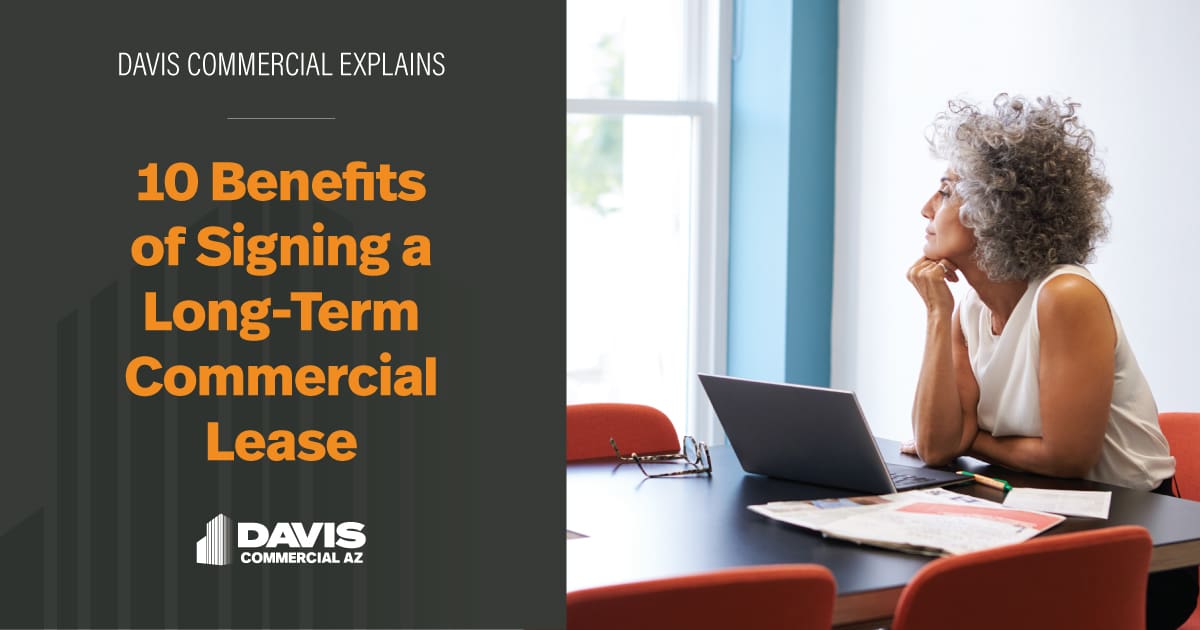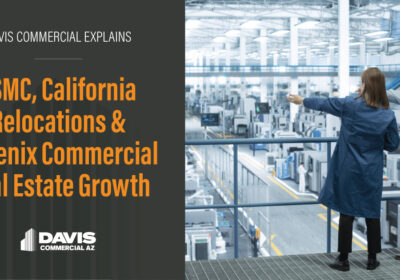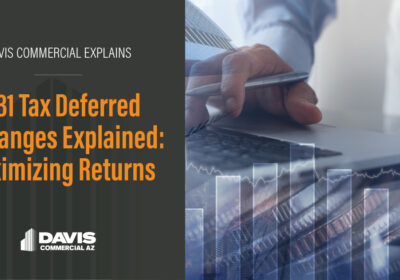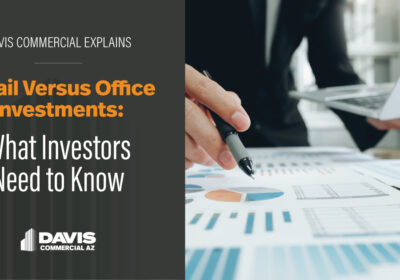10 Benefits of Signing a Long-Term Commercial Lease

Signing a long-term commercial lease agreement offers many benefits. Most notably, it provides stability and predictability, although the benefits of a longer lease agreement will depend on the business model and overall goals and objectives. The typical duration of a long-term commercial lease is anywhere from 5 to 10 years (with an option to renew), but it can be longer. The length of a lease agreement is influenced by several factors, including the property type, the current state of the market, and the needs of the tenant. To better understand when and why a company or business owner may want to consider a longer lease, we put together this blog.
First, let’s examine the main advantages of a long-term commercial lease before looking at some of the most common mistakes made during the process of securing this type of leasing contract.
Cost stability
A long-term commercial lease offers tenants stability, making it easier to plan and budget for the future as rental rates are typically locked in for several years. This protects the tenant from market fluctuations or increasing rents. Oftentimes, landlords may agree to a lower initial rent in exchange for a longer commitment by enticing the tenant with more favorable terms at the beginning of the lease.
A sense of security
Locking in a long-term lease allows a business to stay in one location for many years without worrying about displacement or the need to secure a new property. The commercial real estate market can be unpredictable, and this stability can help maintain consumer loyalty as well as operational continuity. This sense of security also mitigates the stress of rising rent prices. If the market becomes volatile, the availability of prime locations becomes limited.
Customization opportunities
Securing a long-term lease gives the tenant more negotiating power to adapt the space to meet its business’ needs. Many landlords or property owners will offer options for improvements that make the property functional for its tenants when it’s a longer lease agreement. These leasehold or tenant improvements can be written into the terms of the lease. Funds can cover renovations or customization that enhances the work environment, which contributes to long-term business success.
Consumer confidence
Clients and customers often value a long-term presence and typically feel more confident doing business with a company that has a long-standing operation. It can also support a company’s brand image, as it sends a message of commitment and stability.
Employee retention
A long-term lease generally signals to employees that the business is in for the long haul. Having a stable work environment is known to boost employee morale, which in turn can help with retention.
Negotiation power
When committing to a longer lease agreement, tenants often gain leverage to negotiate more favorable terms. It can include tenant improvement allowances, additional maintenance, or cleaning services, and in some cases reduced rent. Negotiating lower costs benefits tenants but landlords also benefit from improvements to the property value and financial security with continued rent.
Better finance access
Lenders and investors look more favorably upon businesses that have secured a long-term location to operate. Oftentimes it makes it easier for a business owner to acquire financing for expansion or other purposes.
Opportunity to secure a prime location
In a competitive market, securing a prime location is more likely with a long-term lease. Locking in a location can block competitors from moving in nearby or keep others from taking over the property. Negotiating a longer-term lease also reduces potential relocation costs as the business won’t have the expense or the headache of moving operations.
Tax benefits
Commercial rent payments have the benefit of being deducted as a business expense in many cases. This reduces the overall tax burden for the business.
Develop strong tenant/landlord relationship
With a long-term lease, there’s opportunity to develop a strong, ongoing relationship with the landlord. This often leads to more flexibility in the future if your business needs shift. For example, subleasing options, renewal of terms etc. However, it also benefits the landlord to have a long-term reliable tenant that is trustworthy.
Davis Commercial AZ Owner and Designated Broker, Andrea Davis shares her industry knowledge and tips on leasing and owning CRE properties in her two books. She has another book in the works focusing on negotiation.
In Davis’s debut book, SimpLEASEity™: Find your dream office without breaking the bank, she outlines the common pitfalls she’s seen through the course of her career when it comes to leasing commercial space or office buildings.
Here is a quick overview of the 10 most common mistakes when leasing CRE property:
- Leasing without professional representation
- Taking one’s time negotiating a lease renewal or new lease
- Undefined business or real estate objectives – a business plan should have a 5 to 10-year lifespan
- Square footage and space inaccuracies – if the space is too big, the business is throwing money away, but if the space is too small it could compromise the revenue of the business too
- Not allowing for expansion space within the lease
- Not accounting for the change in market rates and market incentives
- Dwelling solely on the rental rate of the lease
- Not reacting quickly enough and missing out on opportunities – a lease isn’t finalized until both parties sign the contract. Until then, the building or suite could be leased to another party
- Not knowing the remodel costs of the space but signing the lease anyway
- Viewing a commercial lease in the same light as a residential one. CRE leasing is complex and completely different from renting an apartment
When entering into any agreement, it’s important to consider the terms carefully. It will not only ensure that the lease aligns with long-term business goals and strategy, it will also protect the tenant from potential legal issues down the road.
If you are a tenant and do not have a representative, we strongly recommend that you do your due diligence and consider a partnership for this process. At Davis Commercial AZ, our tenant representation specialists understand how significant it is to find the right space for our clients. Whether you are seeking an entirely new space or negotiating a lease renewal, we will represent your business needs and help manage expectations. Learn more about our company and its services and get in contact here.
Related Posts

TSMC, California Relocations & Phoenix Commercial Real Estate Growth
Phoenix commercial real estate continues to attract national attention as major employers and corporate relocations…

Why a Build-To-Suit May Be a Smart Choice for Businesses
Elevated interest rates, selective lending and mixed signals in national headlines have created confusion about…

1031 Tax Deferred Exchanges Explained: Maximizing Returns
As businesses grow and operations evolve, so do their property needs. The need for new…

Retail Versus Office Investments: What Investors Need to Know
Not all commercial real estate properties are created equal. Whether you’re eyeing a retail center…
